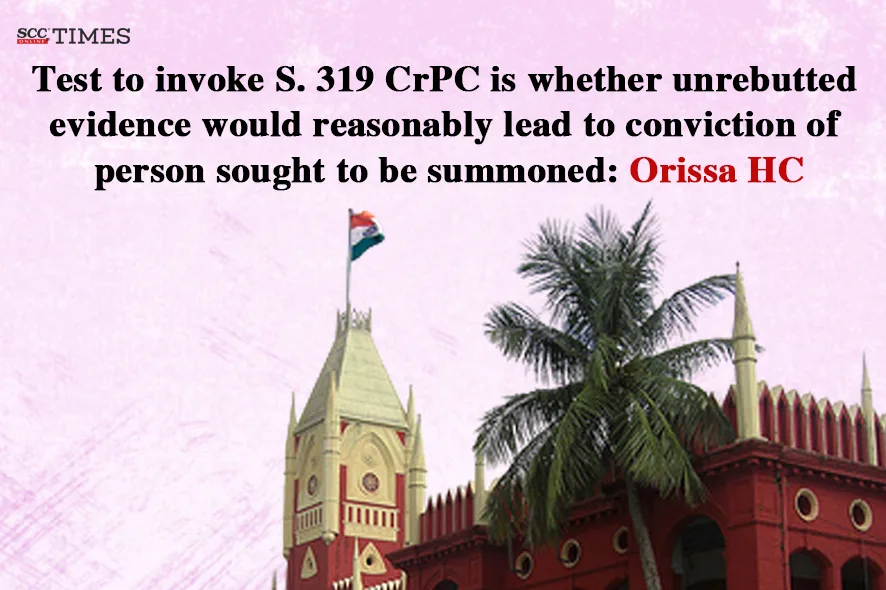Orissa High Court: The present application was filed by the petitioner seeking to quash the order passed by the 1st Additional Sessions Judge, Baripada, whereby he was summoned under Section 319(1) Criminal Procedure Code, 1973 (‘CrPC’) to face trial. A Single Judge Bench of Chittaranjan Dash, J., while allowing application took note of the informant’s allegation that his son was murdered by his daughter-in-law, who was in a love relationship with the petitioner and held that the depositions implicating the petitioner rested entirely on suspicion and surmises, without even a semblance of evidence showing his participation in the preparation or commission of the offence.
Background:
The informant, father of the deceased, filed a report alleging that his son was murdered by his daughter-in-law on the night of 28-04-2019. It was alleged that the deceased had been subjected to mental and physical torture by his wife, who was allegedly in an extra-marital relationship. Due to this strained relationship, the deceased had previously approached the police, reporting threats to his life, though a compromise was reached on the matter. The deceased lived separately with his family, but the informant often slept at his house.
On the night of the incident, the informant heard groaning sounds while sleeping at the house. Upon knocking, neither the son nor the daughter-in-law had responded. Neighbours were called, and after their insistence, the daughter-in-law had opened the door. The son was found with bleeding injuries on his nose and neck. He was rushed to the hospital, where he was declared dead due to strangulation. A case was registered under Section 302 read with Section 34 of the Penal Code, 1860 (‘IPC’) and the investigation commenced.
During investigation, it was alleged that the petitioner (the cousin) admitted to having a relationship with the informant’s daughter-in-law. Witnesses (PWs 2, 3, 7, and 8) testified about the affair and its impact on the marital life of the deceased. The Trial Court, based on these statements, summoned the petitioner under Section 319 CrPC, finding prima facie material suggesting his involvement.
The petitioner argued that the evidence only pointed to an affair and did not establish any direct, circumstantial, or conspiratorial role in the murder. However, the State contended that Section 319 CrPC empowered the Court to summon even non-charge-sheeted individuals if strong suspicion had arisen during trial.
Analysis and Decision:
The Court examined the decision of the Trial Court and had observed that the sole basis for arraying the Petitioner as an accused was the statements made by certain witnesses during trial, specifically PWs 2, 3, 7, and 8. The Court, therefore, considered it necessary to briefly review their evidence.
The Court noted that the order did not reflect consideration of any material beyond the statements of these witnesses to implicate the Petitioner under Section 319 CrPC. The Court emphasised that the test for invoking Section 319 CrPC was whether the evidence, if left unrebutted, would reasonably lead to the conviction of the person sought to be summoned. In the absence of such satisfaction, the Court held that it ought to refrain from exercising the extraordinary power conferred by the said provision.
The Court highlighted that, in the instant case, the statements, whether read conjointly or individually, merely indicated that the accused, the wife of the deceased, had been having a love affair with the cousin brother of the deceased, thereby giving rise to suspicion of an illicit relationship. Admittedly, there had been no eye-witness to the occurrence, and the Court noted the absence of any material on record to connect such statements into a chain of circumstances pointing towards the guilt of the Petitioner. The Court further observed that the said evidence, by itself, did not furnish a basis to array him as an accused for the grave offence of murder, since, at best, it rendered his conduct questionable.
The Court further noted that the accused’s own statement had disclosed the presence of two other persons in the alleged crime, who had already been charge-sheeted. It had emphasised that the depositions implicating the Petitioner rested entirely on suspicion and surmises, without even a semblance of evidence showing his participation in the preparation or commission of the offence.
Consequently, the Court observed that there was no material on record, direct or circumstantial, to establish his presence with the accused at the relevant time or otherwise to generate even a strong suspicion sufficient to attract Section 319 CrPC. The Court, therefore, quashed the order passed by the 1st Additional Sessions Judge, Baripada. Accordingly, the application was allowed.
[Hrushikesh Panda v. State of Orissa, 2025 SCC OnLine Ori 3500, decided on 12-09-2025]
Advocates who appeared in this case:
For the Petitioner: D. P. Dhal, Sr. Advocate
For the Opposite Parties: N. Praharaj, A.K. Apat, Addl. P.P




